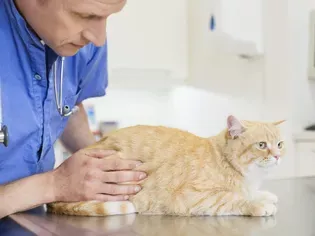Hookworms in Cats
Updated on 04/26/24

Hookworms in Cats: A Comprehensive Guide to Detection, Treatment, and Prevention
Introduction
Hookworms, tiny intestinal parasites, pose a significant threat to cats' health. If left untreated, they can cause severe anemia, weight loss, and even death. As a responsible cat owner, it's crucial to understand hookworm infestations, their symptoms, and the necessary steps to protect your feline companion.
Understanding Hookworms
Hookworms are roundworms that attach to the lining of the small intestine, feeding on blood. This blood loss leads to anemia, weakness, and stunted growth. Hookworm eggs are passed in the feces of infected cats and can survive in the environment for months, making reinfection a risk.
Symptoms of Hookworm Infection
Early detection of hookworm infestation is essential for effective treatment. Common symptoms include:
* Anemia: Pale gums, weakness, and lethargy
* Weight loss: Despite a healthy appetite
* Diarrhea: May contain blood or mucus
* Vomiting: Especially in kittens
* Rough coat: Due to poor nutrition
* Stunted growth: In kittens and puppies
* Poor appetite: In severe cases
Diagnosis and Treatment
If you suspect your cat is infected with hookworms, consult your veterinarian immediately. They will perform a physical exam and fecal test to confirm the diagnosis. Treatment typically involves oral medication, such as albendazole or fenbendazole, to kill the hookworms. Multiple doses may be necessary to ensure complete eradication.
Prevention
Preventing hookworm infestation in cats is crucial for their long-term health. Here are some preventive measures:
* Regular deworming: Deworm your cat every 3-6 months or as recommended by your veterinarian.
* Limit outdoor access: Restrict cats from roaming in areas where they may encounter contaminated soil.
* Control fleas: Fleas can transmit hookworms, so keep your cat free of these parasites.
* Clean feces regularly: Remove your cat's feces from the yard or litter box daily to prevent environmental contamination.
* Quarantine new pets: Isolate new cats for 30 days and deworm them before introducing them to your resident cats.
Case Studies
* Example 1: Max, a 6-month-old kitten, developed lethargy and a poor appetite. His gums were pale, and he had lost weight despite eating normally. Fecal testing revealed hookworm eggs. Max received albendazole medication and showed significant improvement within a week.
* Example 2: Luna, an adult cat, presented with diarrhea and vomiting. Her coat was dull, and she had difficulty moving. Blood tests confirmed anemia, and a fecal test detected hookworm larvae. Luna was treated with fenbendazole and supportive care, and she recovered fully.
Conclusion
Hookworms are a serious health concern for cats. By understanding the symptoms, diagnosis, treatment, and preventive measures, cat owners can protect their beloved companions from this potentially life-threatening parasite. Regular deworming, controlled outdoor access, flea control, and proper hygiene are essential for maintaining the health and well-being of your feline friend.
Explore More Pets

Cat Behavior Problems
How to Stop Aggression in Kittens

Long-Haired Cat Breeds
Siberian Cat: Breed Profile, Characteristics, & Care

Cat Behavior Problems
How to Stop Kittens From Scratching and Biting

Long-Haired Cat Breeds
Turkish Angora: Cat Breed Profile, Characteristics & Care

Basic Training
How to Socialize Your Kitten

Short-Haired Cat Breeds
Cute Pictures & Facts About Calico Cats & Kittens

Litter Box Training
Training Your Kitten to Use the Litter Box

Long-Haired Cat Breeds
10 Fun Facts About White Cats